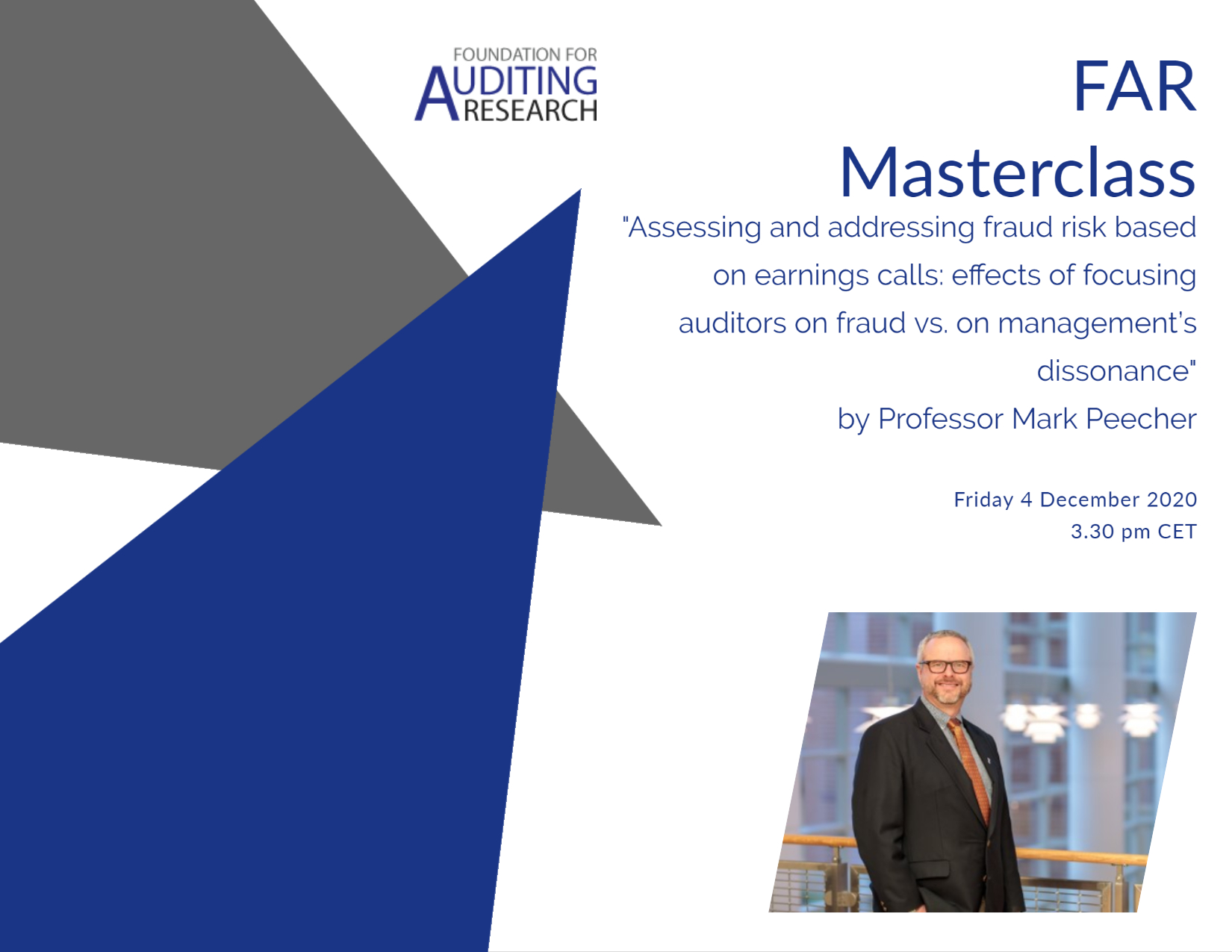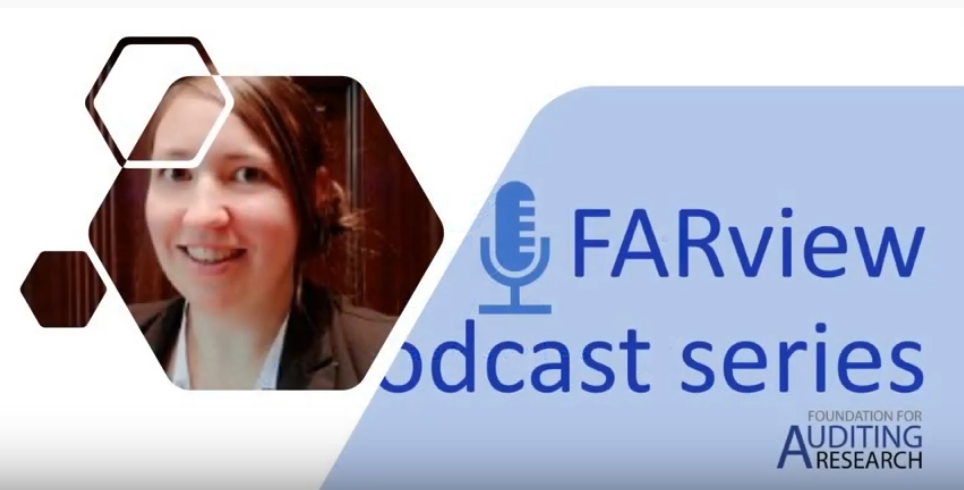Newsletter October 2020
30 October 2020

Want to be the first to know? Then don't forget to follow our LinkedIn page. Did you know that FAR also has a YouTube channel? Here you can find all of the FARview Podcasts.
In this newsletter:
- Online FAR Masterclass on 4 December 2020 by Professor Mark Peecher on “Assessing and addressing fraud risk based on earnings calls:
effects of focusing auditors on fraud vs. on management's dissonance” - Key take-aways online FAR Masterclass by Professor Jasmijn Bol on "The effect of audit culture on audit quality" – 16 October 2020
- FAR Conference editorial including Q&A on ‘Economic consequences of joint audits’ by Prof. dr. A. Schatt
- PhD defence Sanne Janssen on “The ins and outs of professional skepticism. Insights into the effect of professional skepticism traits on the inputs, process, and outputs of the audit"
- Upcoming events – save the date!
Online FAR Masterclass by Professor Mark Peecher on “Assessing and addressing fraud risk based on earnings calls: effects of focusing auditors on fraud vs. on management's dissonance”
On Friday 4 December 2020, from 3:30 – 5:00 pm CET, FAR will organize an online Masterclass by Mark Peecher, who is a Professor at Illinois, Gies College of Business.
Registration is now open via this link.

What is this Masterclass about?
Listening to earnings calls has the potential to improve auditors’ exercise of professional skepticism, as these calls can reveal signs of aggressive financial reporting or even fraud. Prior research shows that experienced audit partners in the United States can detect signs of deception in earnings calls at rates well above chance, but only if instructed to watch for signs of dissonance in management as opposed to watch for signs of fraud. Thus, while experienced auditors appear to have an ability to detect signs of deception, they appear to subconsciously suppress this ability due to the aversive nature of fraud and disincentives for suspecting fraudulent financial reporting. A limitation of prior research is that the auditors were listening to earnings call of non-clients, and it could be that auditors psychologically are more reluctant to see and respond to fraud indicators at their clients.
The project team address this limitation and advances the literature by conducting a field experiment in which 184 auditors listen to their own clients’ earnings calls in the midst of audit engagements. They examine how auditors alter their assessment of the risk of material misstatement, including fraud risk, their plans for addressing these assessed misstatement risks, and the correlation between these two. Rather than focusing only on experienced audit partners, the team uses auditors with a wide range of audit experience. Further, they also use a control group of auditors listening to the same earnings calls for non-clients.
Preliminary results indicate that what auditors think they learn from earnings calls differs markedly based whether or not they are instructed to focus on fraud indicators, focus on indicators of dissonance in managers, or both. They find that prompting auditors to focus on fraud actually reduces auditor concern about fraud risk unless accompanied also by a dissonance prompt. Prompting a focus on management dissonance, by contrast, results in an increase in auditors’ assessed risk of material misstatement and strengthens the correlation among assessing and addressing risk.
Key take-aways online FAR Masterclass by Professor Jasmijn Bol on "The effect of audit culture on audit quality" – 16 October 2020
On 16 October 2020, Professor Jasmijn Bol (Tulane University) presented a FAR Masterclass, based on the FAR research with Isabella Grabner, Katlijn Haesebrouck and Mark Peecher. In this research study, the project team examines the management controls that increase auditors’ willingness and capability to focus on audit quality. In her interactive presentation, attended online by about 60 participants, Jasmijn particularly focused on the reasons that makes auditors push harder for audit quality and what audit firms (can) do to stimulate this. The results from the study show that a better understanding of an audit firm’s values, objectives and priorities leads to a higher push for quality. A higher push is also associated with, for example, higher auditor competence, higher skepticism, sufficient budget and less ‘incentive conflict’ (for example, a conflict between pushing for audit quality and individual rewards). But there was much more, soon to be summarized in a more elaborate report. Stay tuned!
FAR Conference editorial including Q&A on ‘Economic consequences of joint audits’ by Prof. dr. Alain Schatt
During our International Conference on 22 June of this year, Professor Alain Schatt (University of Lausanne) gave a presentation about the ‘Economic consequences of joint audit’.
Professor Schatt presented a literature review on the use of joint audits in France. The use of joint audits has recently been brought up in the Netherlands, as a result of the publication of the 2018 AFM report ‘Kwetsbaarheden in de structuur van de accountancysector’ ('Vulnerabilities in the structure of the accountancy sector'). Schatt elaborated on the potential economic consequences of the joint audit in terms of market concentration, audit costs and audit quality. As also concluded in the AFM report, the current approach to the joint audit in France is not working as desired. In practice, the joint auditors simply divide the audit work and the smaller parties perform the easiest part. ‘Voluntary joint audits actually don’t exist’, says Schatt. This makes sense, he thinks, since overall, audit research hasn’t found evidence that joint audits have a positive effect on audit quality, but audit fees are higher. For example, in Denmark the audit quality didn’t decrease after the joint audits were abandoned, but audit fees decreased. Hence, Schatt concludes that there are no clear benefits of a joint audit, in the current applications. For example, joint audits don’t change the market concentration. The big firms still serve the major part of the market. However, according to Schatt, probably you simply need large offices to control large companies. Further research should show whether and how the joint audit model could contribute. That is also a recommendation in the recent report of the Commissie toekomst accountancysector (‘Committee on the future of the accountancy sector’).
The full editorial article can be read here. The practice note and full report, written by Alain Schatt and co-author Professor Jean Bédard, can be read here.
For the presentation slides that were used at the conference, click here. If you are interested in seeing and listening to the full video of the presentation of that day, please click here.
If you would like to have more information about the conference, the summary and videos of the conference can be found here.
PhD defence Sanne Janssen on “The ins and outs of professional skepticism. Insights into the effect of professional skepticism traits on the inputs, process, and outputs of the audit”
On Friday the 25th of September Sanne Janssen successfully completed her thesis entitled 'The Ins and Outs of Professional Skepticism. Insights into the Effects of Professional Skepticism Traits on the Inputs, Process, and Outputs of the Audit'.
Sanne is also a researcher for FAR, the chapters 2 and 3 of her dissertation relate to the FAR research 'project 2016B05 Hardies' by Prof. K. Hardies entitled 'Professional Skepticism Profiles, Effects on Audit Processes and Outcomes, and the Moderating Role of Audit Firm Culture'.
The abstract of the thesis is as follows:
The objective of an external audit is to provide assurance to the users of financial statements on the quality of the reported information. A quality audit is therefore essential for the functioning of capital markets. The exercise of professional skepticism is often described as a key attribute for a quality audit. However, despite its alleged importance, the concept of professional skepticism is not well understood. This dissertation advances our understanding of professional skepticism by investigating professional skepticism traits as input factors, and as drivers of process and output factors of the audit. Results of this dissertation show that professional skepticism traits of auditors are significantly affected by personality traits and other individual differences and differ significantly across ranks. Further, it shows that professional skepticism ultimately affects audit quality as professional skepticism traits are significant drivers of certain audit process and output factors. The holistic approach used in this dissertation allows me to provide recommendations for practitioners to enhance the exercise of professional skepticism.
You can read the full PhD here.
On SSRN you can find the 2 papers of the thesis for which FAR data was used:
https://papers.ssrn.com/sol3/papers.cfm?abstract_id=3717615
https://papers.ssrn.com/sol3/papers.cfm?abstract_id=3719155

Our tenth episode of our FARview series is now online. You can listen to dr. Sanne Janssen, who was interviewed following her successful defence.
The podcast discusses the importance of professional skepticism for auditing.
You can listen to the podcast (in Dutch) on our YouTube channel or via Soundcloud.
Upcoming events – save the date!
Brown bag seminar – FAR Assurance Young Profs - Junior Academics Meeting / Seminar on 13 November 2020
On Friday 13 November 2020 FAR will host an online seminar for young profs and young academics.
The purpose of this session / seminar is twofold:
Get input from practicing audit young professionals on FAR’s research agenda.
Junior academics (PhD candidates, post-docs, beginning associate professors) to pitch research ideas and preliminary result and receive practitioner feedback and test whether their ideas make sense for practitioners.
Participation is on invite only. However, if you are interested to attend a next session, please send an email to info@foundationforauditingresearch.org
Online FAR Masterclass – Professor Mark Peecher
On Friday 4 December 2020 FAR will host an online Masterclass by Mark Peecher on “Improving audit quality by enhancing auditor’s detection of markers of management deception”.
Registration is now open! You can read more in the second news item of this newsletter.
FAR International Conference 2021
We hope to see you all live next year at the FAR Conference on 21 and 22 June 2021 in Breukelen, the Netherlands. Please save the date in your calendar!”¯
Do you have suggestions on how to improve our newsletter or news you would like to share with us? Please let us know by sending an email to
info@foundationforauditingresearch.org
Back to overview
